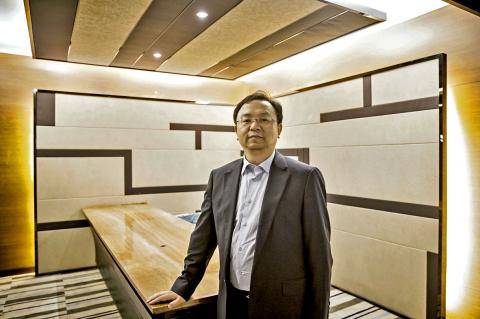BYD Co (比亞迪), the electric car maker that counts Warren Buffett’s Berkshire Hathaway Inc as a shareholder, is in talks with several of China’s smaller cities to build monorail systems to pre-empt traffic congestion spurred by rapid growth in automobile ownership.
Monorail systems are a potential 3 trillion yuan (US$450 billion) market in China, based on an average 70km network in each of an estimated 300 cities, and will become a new major growth area for the company, BYD chairman Wang Chuanfu (王傳福) said.
The elevated single-rail tracks can be built on road dividers and are especially suited for smaller, less-developed cities, because they cost one-sixth the price of a subway system and are cheaper to maintain, Wang said.

Photo: Bloomberg
With the number of private vehicles growing at an average annual rate of 15 percent in such cities and road space at only 1 percent, urban areas are on course for the same gridlock gripping major Chinese cities such as Beijing if they do not adopt light transit, he said.
“For many of these cities facing traffic congestion and financial constraints, if you can’t go underground, you have to go above,” Wang said in an interview on Monday in Tianjin, adding that the discussions are preliminary.
After leading BYD to top electric vehicle sales in China, Wang is steering the company into monorail as an area where he sees high barriers to entry and fewer competitors. The foray is taking place as industry sales of “new energy” vehicles more than tripled last year, attracting a wave of start-ups touting their plans to build battery-powered cars. Besides autos, BYD’s other businesses include producing handsets and storage batteries.
“BYD is taking advantage of its relationships with municipalities and the know-how in urban public transport that it’s built through the years marketing electric buses,” said Steve Man, an auto analyst with Bloomberg Intelligence. “The foray into electric monorail expands the company’s electric propulsion and battery businesses.”
Monorail elsewhere in Asia includes the system operated by Bangkok’s BTS Group Holdings PCL, which uses 208 railcars built by Siemens AG and CRRC Corp in Thailand’s capital, according to its Web site.
BYD’s competitors in monorail will include Bombardier Inc and Hitachi Ltd, Wang said.
BYD plans to utilize its core technology in electric vehicles, batteries and materials to build the monorail systems, which would be paid for by local governments, he said.
The company is to begin operating a 4.4km line at its base in Shenzhen in September, he said. An eight-carriage train will be able to carry about 1,600 standing passengers.
“Expanding into this new area further extends BYD’s product lineup and brings new opportunities,” an analyst at Citic Securities Co in Beijing said. “The challenge is whether and how quickly Chinese cities will embrace such new transportation options.”

Nvidia Corp chief executive officer Jensen Huang (黃仁勳) on Monday introduced the company’s latest supercomputer platform, featuring six new chips made by Taiwan Semiconductor Manufacturing Co (TSMC, 台積電), saying that it is now “in full production.” “If Vera Rubin is going to be in time for this year, it must be in production by now, and so, today I can tell you that Vera Rubin is in full production,” Huang said during his keynote speech at CES in Las Vegas. The rollout of six concurrent chips for Vera Rubin — the company’s next-generation artificial intelligence (AI) computing platform — marks a strategic

REVENUE PERFORMANCE: Cloud and network products, and electronic components saw strong increases, while smart consumer electronics and computing products fell Hon Hai Precision Industry Co (鴻海精密) yesterday posted 26.51 percent quarterly growth in revenue for last quarter to NT$2.6 trillion (US$82.44 billion), the strongest on record for the period and above expectations, but the company forecast a slight revenue dip this quarter due to seasonal factors. On an annual basis, revenue last quarter grew 22.07 percent, the company said. Analysts on average estimated about NT$2.4 trillion increase. Hon Hai, which assembles servers for Nvidia Corp and iPhones for Apple Inc, is expanding its capacity in the US, adding artificial intelligence (AI) server production in Wisconsin and Texas, where it operates established campuses. This

Garment maker Makalot Industrial Co (聚陽) yesterday reported lower-than-expected fourth-quarter revenue of NT$7.93 billion (US$251.44 million), down 9.48 percent from NT$8.76 billion a year earlier. On a quarterly basis, revenue fell 10.83 percent from NT$8.89 billion, company data showed. The figure was also lower than market expectations of NT$8.05 billion, according to data compiled by Yuanta Securities Investment and Consulting Co (元大投顧), which had projected NT$8.22 billion. Makalot’s revenue this quarter would likely increase by a mid-teens percentage as the industry is entering its high season, Yuanta said. Overall, Makalot’s revenue last year totaled NT$34.43 billion, down 3.08 percent from its record NT$35.52

SEMICONDUCTORS: The German laser and plasma generator company will expand its local services as its specialized offerings support Taiwan’s semiconductor industries Trumpf SE + Co KG, a global leader in supplying laser technology and plasma generators used in chip production, is expanding its investments in Taiwan in an effort to deeply integrate into the global semiconductor supply chain in the pursuit of growth. The company, headquartered in Ditzingen, Germany, has invested significantly in a newly inaugurated regional technical center for plasma generators in Taoyuan, its latest expansion in Taiwan after being engaged in various industries for more than 25 years. The center, the first of its kind Trumpf built outside Germany, aims to serve customers from Taiwan, Japan, Southeast Asia and South Korea,